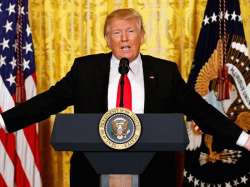Working with US Congress hasn't been as easy as Donald Trump predicted
Shortly after taking over as US President on January 20 this year, Donald Trump had predicted that the US Congress will now be the busiest America had in decades.

Shortly after taking over as US President on January 20 this year, Donald Trump had predicted that the US Congress will now be the busiest America had in decades.
However, things have not moved on the way he had planned.
With Republicans in charge of the House, the Senate and the White House for the first time in a decade, Trump didn't reckon with the reality of GOP divisions so intractable they may doom his major legislative priorities.
A restive right flank willing to defy party leaders dealt him a humiliating setback on health care last month. That called into question whether Republicans will ever make good on their longstanding promise of repealing and replacing former President Barack Obama's Affordable Care Act. If they can't, they will likely also struggle to produce the sweeping tax legislation and massive infrastructure investments that Trump promised.
The White House is pushing House GOP leaders to try again on health care, and there's been recent progress as the conservative House Freedom Caucus endorsed the latest version of the bill. But leaders are struggling to round up support from more moderate Republicans, and it's uncertain when or if the legislation will come to a vote.
Meanwhile, the government is operating under a one-week, stopgap spending bill to avert a shutdown on Saturday, which coincides with Trump's 100th day in office. Lawmakers needed more time to finish their sweeping $1 trillion legislation for the remainder of the 2017 budget year, work that is Congress' most basic function.
The White House intervened in the negotiations late in the game to make demands on issues including the U.S.-Mexico border wall — subsequently dropped. That was an intervention even some Republicans said was not productive.
With little in the way of actual results so far, some Republicans have begun to fret openly about their thin record of accomplishments, and sound alarms about a backlash from voters if the GOP doesn't begin to produce.
"We can't afford to go to the country in 2018 with a Republican president, Republican Senate and Republican House and say 'well we just couldn't get it done,'" said GOP Rep. Tom Cole of Oklahoma. "That's not defensible."
Trump himself voiced frustration in an interview airing Friday on Fox News Channel, saying, "I'm disappointed that it doesn't go quicker."
"I think everybody is trying very hard," the president said. "It is a very tough system."
It wasn't supposed to be this way after eight years of chafing under Obama.
House Speaker Paul Ryan of Wisconsin and Senate Majority Leader Mitch McConnell of Kentucky pledged they would seize the opportunity to work with the new Republican president and enact a bold GOP vision starting with making good on seven years of promises to get rid of Obama's health law and replace it with something better. Comprehensive tax reform was to follow, plus work on infrastructure, immigration, an orderly budgeting process emphasizing GOP priorities, and more.
"The people have given us unified government. And it wasn't because they were feeling generous. It's because they wanted results," Ryan said in his opening day address to the House in January after his election as speaker. "How could we live with ourselves if we let them down?"
It didn't take long for lofty goals to fizzle as it became clear that Republicans, after achieving political success as an opposition party, were less accustomed to the role of governing.
Trump himself, unfamiliar with the arduous process of legislating, set unrealistic goals, pledging an Obamacare repeal on Day One, something that was never going to happen. Other legislative priorities he had promised to work on with Congress during his first 100 days — including school choice legislation, ethics reforms and a community safety bill — have barely been discussed at all.
The one bright spot that stands out for many Republicans is Senate confirmation of Neil Gorsuch to the Supreme Court. It took breaking Senate rules to do it, but for many Republicans lifetime appointment of a young and reliably conservative jurist makes up for many other deficiencies.
"There are some people I know who voted for Trump solely because he would put a conservative on the court, so they're good," said Rep. Tom Rooney, R-Fla.
Republicans also point to progress on regulatory issues, with Congress employing a tool called the Congressional Review Act, previously little used, to undo a raft of regulations passed toward the end of the Obama years.
For their part, Democrats scoff at the GOP's underwhelming record, noting that Congress passed a massive economic stimulus bill and other legislation during Obama's first 100 days.
"Republicans have not accomplished very much in the first 100 days," said Senate Minority Leader Chuck Schumer of New York. "If they reach out to Democrats and work in a bipartisan way they could get a lot more done."
Republicans say the best could still be yet to come, with House leaders nurturing hopes of passing their health bill as soon as next week along with completing work on the 2017 spending bills, which would allow them to turn to tax legislation and other issues.
(With AP inputs)